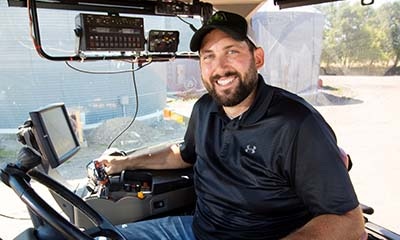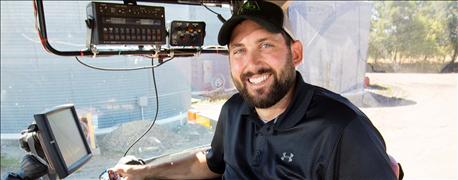
Clay Smith knows what corn, soybeans and wheat yield on his North Dakota farm. But by using his new data system, he can now compare those yields with others in the area and then make changes to his operation if necessary.
The same with buying seeds for next year’s corn and soybean planting. With a few keystrokes, his Farmers Business Network (FBN) system lets him see prices of various hybrids and study how those hybrids performed in his area.

Clay Smith likes Farmers Business Network’s Seed Finder system, which he uses to compare prices and performance history of various hybrids before buying. (Photo: John Borge)
“Everything is anonymous, and you get a true comparison from one farm to the next of what the yields were with a certain variety. That is really what I was looking for,” Smith says. “We have always been Pioneer corn and Pioneer beans. But if we see one that is a little bit cheaper and gets a little bit better return, we probably are going to use it.”
This is how technology is changing agriculture. New companies have come on line and offer a vast array of services that save farmers time and money in handling machinery operations, buying inputs, monitoring the weather and marketing crops.
For Travis Senter, who raises rice, beans, corn and cotton near Osceola, Ark., the John Deere Operations center he uses saves him valuable time in managing all of the farm’s equipment. He knows where the machines are, how much work is left to be done and more.
“Time is important when you need to make a decision,” he says. “You need to have all the information available quickly to help give you the right answer.”
Reluctance remains
The technology is new, and farmers have been slow to get on board as concerns remain about data security, usability, cost of the systems and the lack of any one company providing a broad menu of services.
Anytime during the day Ken Dalenberg can tap into one tablet computer and pull up the per acre cost of a corn hybrid seed, get a performance history of that seed and then find data on how much fertilizer he will need for that seed to reach its full potential.
“It is more about efficiency than cost savings. It is about saving time, It is about increasing output, which lowers your per unit cost,” says Dalenberg, an Illinois corn and soybean farmer, who for decades has been aggressive in adopting new farm technology, whether it was yield monitoring in 1990s or automatic guidance systems for tractors and combines a decade later.
Dalenberg has talked with many of the precision agriculture and data companies, and subscribes to a few of them. He says farmers need to do their homework before subscribing.
“They need to sit down and look at what their needs are, because each one of these data systems is different. They all have something unique,” he says. “There is not one that covers everything, and this is part of the problem.”
He expects consolidation will eventually narrow the field of data providers so that those that remain will offer a broad list of data services that should ease the stress of farmers having to decide which one to choose.
Learning these systems can be work, particularly for farmers who are not technically adept or are pressed for time, says Kip Pendleton, a Minneapolis-based consultant who works with farmers and agriculture companies on technology issues. Despite the growth in ag tech companies, Pendleton said this area of farming is still new.
“That said, the top 20% to 30% of farmers are using some form of this new Decision Ag technology to really use their collected data, Remember, we are 20-plus years into precision agriculture and about three-plus years into digital agriculture,” he says.
Until then, farmers can get some guidance on what is available via the Agriculture Data Coalition website at agdatacoalition.org. ADC is a collection of farmers, universities, industry firms and agriculture technology providers who are working together to help farmers control and manage their data. The website also features a list a member companies from which farmers can learn about new services.
Also, farmers should plan on attending the inaugural Ag Data Conference. This conference was designed by the editors of industry-leading information brands Corn+Soybean Digest, Farm Futures and Farm Industry News. It will be Nov. 29-30 at the Coralville Marriott Hotel & Convention Center near Iowa City, Iowa.
One downside farmers have mentioned about using an online marketplace would be the lack of personal relationships and trust that has been built up with longtime dealers. However, North Dakota’s Smith says he will continue working with his local dealer but still use FBN’s Seed Finder for price discovery and brand selection.
Want to learn how ag data can help you make better decisions on the farm? Join us for The Ag Data Conference, Nov. 29-30, at the Coralville Marriott and Conference Center, Coralville, Iowa. Don’t miss this chance to hear from farmer-users as well as industry leaders. Find solutions at The Ag Data Conference.
About the Author(s)
You May Also Like




